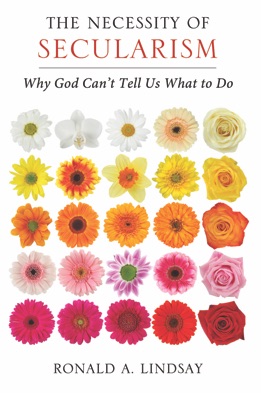About the Book
For the first time in human history, a significant percentage of the world’s population no longer believes in God. This is especially true in developed nations, where in some societies nonbelievers now outnumber believers. Unless religion collapses completely, or undergoes a remarkable resurgence, countries across the globe must learn to carefully and effectively manage this societal mix of religious and irreligious. For in a world already deeply riven by sectarian conflict, this unprecedented demographic shift presents yet another challenge to humanity. Writing in an engaging, accessible style, philosopher and lawyer Ronald A. Lindsay develops a tightly crafted argument for secularism—specifically, that in a religiously pluralistic society, a robust, thoroughgoing secularism is the only reliable means of preserving meaningful democracy and rights of conscience. Contrary to certain political pundits and religious leaders who commonly employ the term secularism as a scare word, Lindsay uses clear, concrete examples and jargon-free language to demonstrate that secularism is the only way to ensure equal respect and protection under the law—for believers and nonbelievers alike. Although critical of some aspects of religion, Lindsay neither presents an antireligious tirade nor seeks to convert anyone to nonbelief, reminding us that secularism and atheism are not synonymous. Rather, he shows how secularism works to everyone’s benefit and makes the definitive case that the secular model should be feared by none—and embraced by all.
Ronald A. Lindsay is president and CEO of the Center for Inquiry and of its affiliates, the Council for Secular Humanism and the Committee for Skeptical Inquiry. He has a PhD in philosophy from Georgetown University, with a concentration in bioethics, and a JD from the University of Virginia. He is the author of the essay “Euthanasia” in the International Encyclopedia of Ethics and of the book Future Bioethics: Overcoming Taboos, Myths, and Dogmas. He lives in Alexandria, Virginia.
About the Author
“The Necessity of Secularism discusses one of the most vital issues facing America and the world, and it does so with the logic and respectful tolerance for differences that itself expresses the very spirit of secularism. No matter what one's views on the existence of God, this is a unifying book. I can only hope that it will be read by all those for whom it is intended, which is, in a word, everyone.”
—Rebecca Goldstein, author of Plato at the Googleplex
“This is a first-rate book. If you want to understand why a secular state is so important, why it’s not the same thing as an atheist state, and why religious people should embrace, not fear, secularism, you should start with The Necessity of Secularism. Lindsay’s book is entertaining, passionate, and presents a beautifully clear and well-argued case.”
—Stephen Law, senior lecturer in philosophy at Heythrop College, University of London and author of Believing Bullshit
Details
ISBN: 978-1939578129 (paperback)
SRP: $16.95 (paperback)
Page count: 224 pages
Trim size: 6 x 9
Pub date: December 1, 2014
Ebook availability: Yes
Audiobook availability: Yes
Introduction. An Unprecedented Moment in Human History. The Birth of the Secular State. From the Secular State to the Secular Society. Why God Can’t Tell Us What to Do. The Common Morality and the Objectivity That Matters. Morality Without a Supernatural Net. Secular Moral Reasoning and Public Policy. Living Together. Acknowledgments. Notes. Index. About the Author
Contents
Op-ed in Los Angeles Times
“If this book doesn’t convince readers of the necessity for a secular public square, as opposed to a sacred public square, then nothing can. It should additionally alleviate any fears believers might have that atheists will cause them harm as they gain more political power. Secularism offers the best protection believers have in a society they no longer control, because it best protects the rights of freedom of conscience and religion in a pluralistic society. A very important and exceptionally argued book!”
—John W. Loftus, author of Why I Became an Atheist and editor of Christianity Is Not Great
“In cogent and frank prose, Lindsay puts forth solid arguments for secularism, soundly advocating for the separation of church and state as well as addressing relevant issues pertaining to morality, public policy, etc. This is not the ranting of an “angry” atheist (as the religious often like to charge), but rather, it is the steady, rational, and eminently reasonable articulation of a thoughtful secularist whose head is clear and whose vision is keen. No, we can’t look to God to tell us what to do, but we can certainly look to Ronald Lindsay.”
—Phil Zuckerman, professor of sociology at Pitzer College and author of Faith No More and Society Without God
“This book makes a powerful and persuasive case for secularism as the common ground where believers and non-believers can participate in public life on equal terms. It is needed now more than ever.”
—Ophelia Benson, Butterflies & Wheels
“Can’t we all get along? Ron Lindsay says yes, in his well-written and easy-to-read book about how atheists and theists can coexist and flourish in a pluralistic society. Unlike most books by atheists, including mine, this one has less to do with promoting atheism and more with respecting and listening to one another, thus making the world a better place for all.”
—Herb Silverman, founder and president emeritus of the Secular Coalition for America and author of Candidate without a Prayer: An Autobiography of a Jewish Atheist in the Bible Belt
“The Necessity of Secularism is a state-of-the-art defense of secular reasoning—in government, public debate, and moral deliberation. There’s erudition here, but always worn lightly, and with it goes a cool, precise, forensic style of argument that’s truly a pleasure to read. Again and again, Ronald Lindsay hits the exactly right notes.”
—Russell Blackford, author of Freedom of Religion and the Secular State and Humanity Enhanced
“Lindsay makes a strong and cohesive argument for ethical decision-making without reference to scripture or divine revelation. Systematic, but highly readable, The Necessity of Secularism is an important contribution to ‘popular philosophy’ in the best and most rigorous sense of the term.”
—Barry Lynn, Executive Director of Americans United for Separation of Church and State and author of Piety & Politics
Advance Praise


Ron Lindsay on The Necessity of Secularism
Video
Review
Discussion about the “nones”



